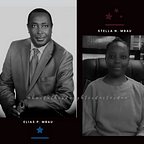Generations for Health Dialogue: The Climate-Health nexus
To watch Generations for Health Youth Dialogues, please see videos at the Generations for Health Facebook page here.
Facilitated by Generation for Health’s Silvia Mosquera Lago
See a clipping of Stella’s video presentation here.
SOURCE: This dialogue was (also) published by the World Press Clubs’ Alliance for Climate here.
Below is a transcript of the clipping:
Silvia:
How does climate change affect our communities’ health?
Stella:
I think I’m going to start with something that’s been in the news, which might be familiar with everybody. We’ve been having a locust invasion, for a really long time actually. So, what that does, is it triggers food insecurity. Which obviously leads to the limited resource, which is food.
This also triggers conflict. These places are also mostly arid so there’s limited water as well, because we have the flooding and the drought cycles. Communities from these places, aside from the clashes, which is the immediate critical impact of a conflict, anybody who is going through this, will encounter hunger and malnutrition.
This is leading to the importation of foods. Which does not make sense because we have so many farmers here, but there’s also other problems the government is not really good at dealing with; which is the issue when you have a lack of awareness.
For example, our maize is GMO. That (maize) is a staple food in Kenya. So, people are not able to replant their maize. We call it ugali, it’s really a staple, but we are not able to feed ourselves and we end up importing from our neighbours. Which does not make sense. So, there are the physical repercussions of that as well as, economic and socio economic. It cascades.
Sivlia:
Why do you think that people don’t go further than ‘climate change only creates floods and droughts’ but don’t really go that extra mile to see it as a global crisis that affects, everything including our health.
Stella:
I think it’s generally an awareness issue. The basic understanding is that it’s changing the climate. How you move from how it’s ‘changing the climate,’ to how it’s affecting you, and the industries you work in and your families? You have to be wiling, to be open, to that awareness. To see it.
Most people are living in their economic bubbles, in their struggles, so much so that they don’t see it. And yet, if you tried to understand why your crops are not growing, why you don’t have enough water around where you live, if you tried to understand why that’s happening, as opposed to struggling with trying to solve that problem in isolation from climate change itself?
It wouldn’t really work, because you’re treating a symptom as opposed to treating the problem or trying to understand the problem; because treating the problem, is also a problem.
Silvia:
A lot of people pointed out that there would be more pandemics in the future. Do you agree on this? Do you believe that this is something that is likely?
Stella:
Covid, is mainly because we are hungry for meat. We want more land to do our farming. We are not really respectful of these lands that are very sensitive. That’s how we come into contact with really sensitive ecosystems.
If we continue on that trajectory, obviously, there will be more and more pandemics. Not only going into the sensitive ecosystems, as it gets warmer, things like mosquitoes and flies, and insects and bugs and pests, will continue to increase in number. Which means, also, we’ll be at a higher exposure to these diseases and these bugs.
We should be more careful about what we do now as we go into the future. We can monitor that to the point that we don’t expose ourselves to that kind of situation. But at the same time, it’s important to point out, that as long as we don’t change anything, it’s going to get worse. That’s for sure.
Silvia:
Last words. Something you would like for people to know.
Stella:
This is by Thomas Berry:
“The natural world is the larger sacred community to which we long, to be alienated from this community is to become destitute in all that makes us human. To damage this community is to diminish our own existence.”
So that’s in relation to our Planet’s health and our own health. If the planet’s not doing well, that has a direct correlation to how we also do, health wise.
Stella Nyambura Mbau PhD
Founder & CEO LOABOWA
#generationsforhealth
